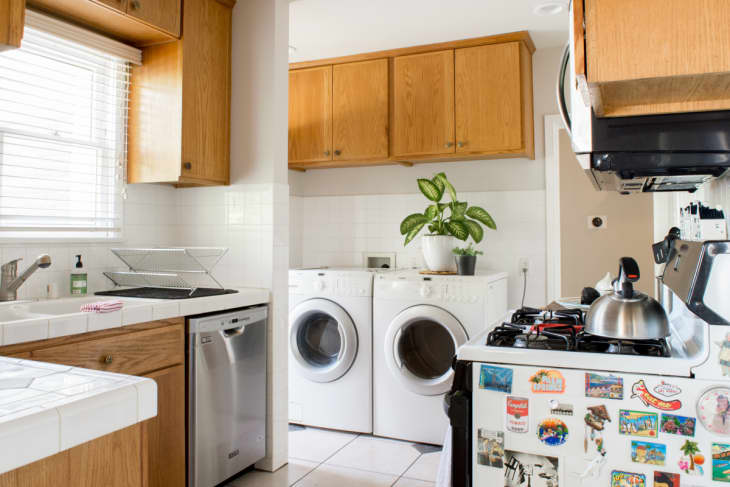How Long Do Washing Machines Last? Here’s What Appliance Pros Say.

It may surprise you to know that washboards and hand-washing clothes made a huge resurgence during the pandemic. And although there is still a nostalgic, antique quality to it that a lot of people love, it’s nice to have a machine to do the work for you. Unless your washing machine breaks, of course. Here’s what to know about how long the typical washing machine will last.
How Long Do Washing Machines Last?
Washing machines typically last between five to 15 years. It all depends on how often you use it, what you put in it, and how you maintain it, according to experts.
How Long Do Washing Machines Last?
You can expect your washing machine to last between five and 15 years. It depends on how often you use it, what you put in it, and how often you maintain it.
“Back in the day, washing machines were built to endure, often hitting the 20-year milestone without breaking a sweat,” says Jason Carter, an appliance technician and owner of SimplySwider.com. “But times have changed, with factors like cost-cutting measures and shifts in manufacturing materials shaking things up.”
If your washing machine hits the 10-year mark and still seems to be working just fine, have it serviced and keep using it. Just watch out for any changes in how it functions.
How Do You Maintain a Washing Machine?
First, don’t overload your clothes; it makes the washing machine work harder than it needs to and shortens the lifespan of the appliance.
“When starting a load of laundry, don’t overfill the drum and make sure to select the correct program for each wash cycle, which will adjust automatically to clean everything from delicate fabrics to heavy clothes with the utmost efficiency,” says Haven Polich, product manager at appliance company ASKO. “Clothes will last longer and so will your machine.”
You’ll also want to clean the washing machine regularly — and that includes running a cycle to clean the interior, scrubbing down the surfaces to clean up all the gunk from detergent, and cleaning the knobs and buttons.
When Should You Replace Your Washing Machine?
Luckily, washing machines let you know pretty quickly that they need to be replaced. Here’s what to look for.
Leaks
If water is getting out, that’s a problem. “Especially if the leak doesn’t seem to be coming from the drain area, this is a sign that your washing machine has a structural problem,” says Nick Valentino, VP of market operations of Bellhop. “Even if the leak isn’t an immediate problem, it’s going to lead to rust and potentially damaged electronics.”
Diminished Performance
If your laundry isn’t as clean as it used to be, or the clothes are getting damaged, it’s probably time to replace your machine. “This is especially true if you find yourself having to adjust the settings to get your clothes cleaner or having to run multiple cycles for them to be adequately washed,” says Keith Sant, founder and CEO of Sell My House Company.
Noises or Vibrations
If you notice weird noises or heavy vibrations coming from your washing machine, it’s an indicator that something is either just about to break or has already broken, says Sazi Bugay, VP of product management at Beko Appliances. It’s something to investigate as soon as the problem happens. If you catch it early, you may be able to repair the appliance and make it last longer.
Gasket Issues Separation
Bugay also says to watch the gaskets. If the drum starts to separate from its housing or you see mold or excessive moisture on the gaskets, that means it’s time to get a new appliance.
More Frequent Repairs
Just like a car, at some point, it becomes time to stop having the thing repaired and just get a new one. “If you find yourself constantly scheduling repairs and spending more on fixes than the machine’s worth, it’s likely a signal to start considering a new unit,” Carter says.
Electrical Issues
You know two things that don’t mix well? Water and electricity. “If you start to notice electrical issues, such as the water not filling up or the machine not spinning when it should, this could be caused by an issue with the motor or internal wiring,” Sant says. That’s both a dangerous problem and a major repair. Consider replacing the entire appliance.